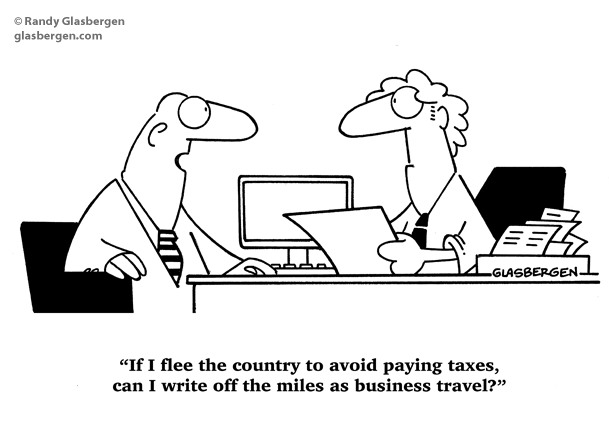All rights reserved. Copyright 2014 Graeme Sharrock and Honolulu Options Traders, LLC
It is a privilege to be an stock or options trader. We see financial miracles occur and enjoy a lifestyle that others envy. But we all have to pay a share of our earnings and support government expenses. Traders need to have a structured approach to their taxes that gives as many deductions as possible and avoids last-minute check-writing.
Here's what to do now. . .
1. Collect Your Records
As a trader, you are running a business. Keeping good records for your trades helps keep you on top of your profits and losses. But you should also keep track of all your other business-related expenses--commissions, computers, seminars, books, travel--as these will help offset any tax liability. Even your home office or phone may qualify as a deduction. Pay for everything with plastic and print off or download your monthly statements. Records help your accountant support your deductions and include expenses you may have missed.
If you are not making a habit of making a record of your daily trading hours, then start now. This could include a daily screen shot of your positions or computer activity, and a log on research or fees paid to consultants or advisers.
2. Meet with your accountant
Stock and options traders deal with complex financial transactions that require expert attention. If you are trading as an LLC or Corporation, you may have extra deductions you can take on your return. Your accountant will be able to help you interpret your yearly results and suggest a payment method that best meets any anticipated tax payments.
To find an accountant who specializes in tax treatment of stocks and options, consult your local society of accountants. Ask for examples of tax returns or printed materials which demonstrate their knowledge of options. Talk to other traders or a local investment club for recommendations.
3. Make trade adjustments in December
Taxes will be owed on the overall profits of your closed trading positions for the year. So if you have significant profits, you may consider strategies which help incur paper losses or defer taking profits until January. For example, spread positions can be divided, taking losses on any losing leg, and holding profitable legs until the New Year. You eventually have to pay taxes on your profits, but will have the use of that money for many months. With that extra time, you can make enough extra profit to pay for your expected tax liability.
4. Estimate your earnings
By early December, you should be able to estimate your annual income from all sources. You can then decide whether to purchase new computing equipment, pre-pay subscriptions or make trade adjustments before Dec 31. You will need to make your tax-deductible donations and obtain receipts. You may also be eligible for certain kinds of credits or rebates based on your income.
5. Invest in your trading business
The best overall tax strategy is to make deductions now and defer profits until next year. You may consider updating your trading skills and equipment in order to maintain or increase your results. If owning an extra monitor or smartphone would help you follow the market action, then take the plunge and buy it in December. You could pre-pay for a 2015 college course in Hedge Fund Management or add some books to your trading library. Of course, ask yourself if really need it and would buy it anyway. If yes, then the purchase becomes a write-off for this year.
Good trading!
Tiger says: ""Investors should remember that excitement and expenses are their enemies. And if they insist on trying to time their participation in equities, they should try to be fearful when others are greedy and greedy when others are fearful." Actually it was Warren Buffett, and who is going to argue with him?
------------------------------------------------------------
